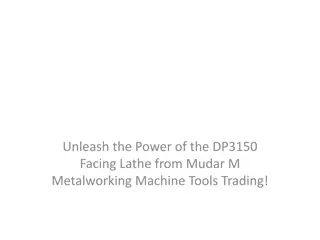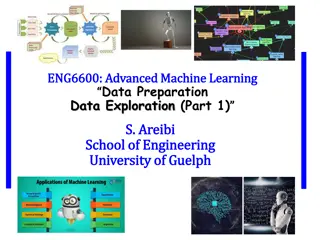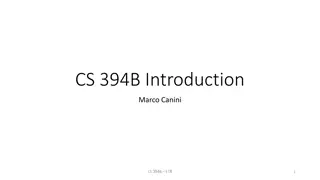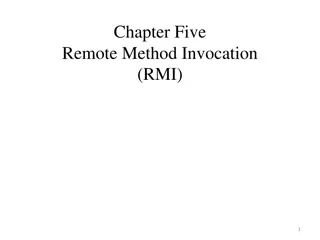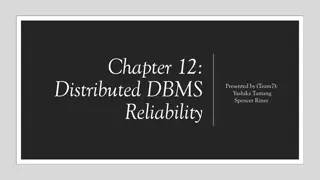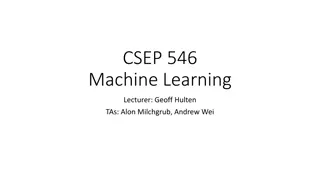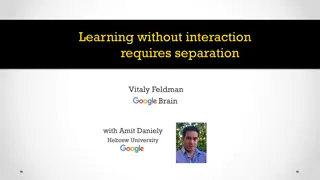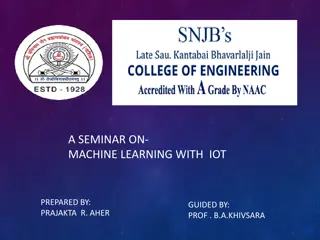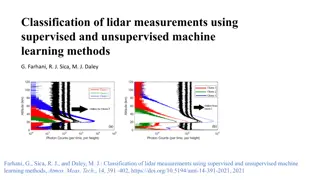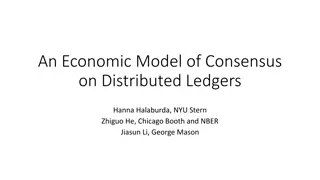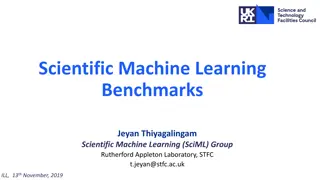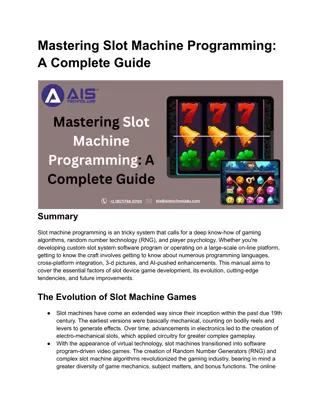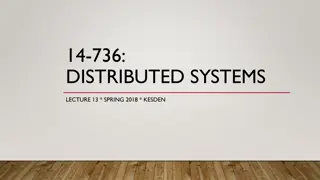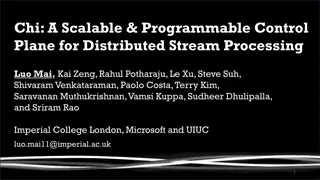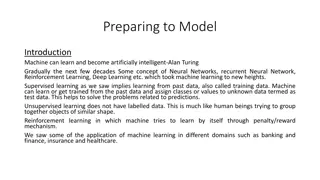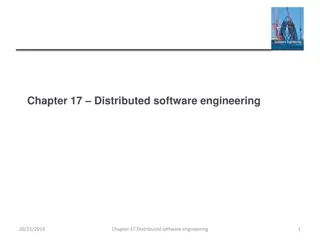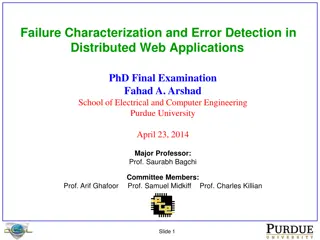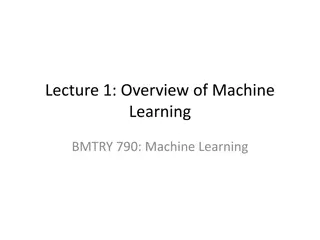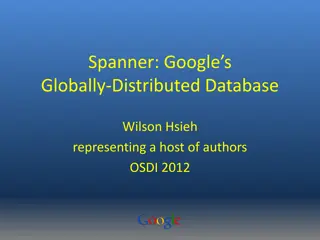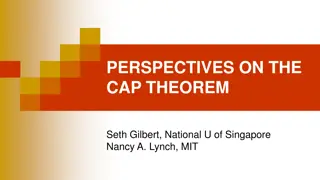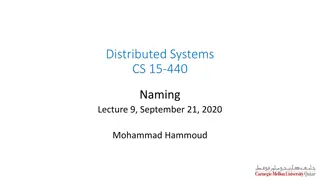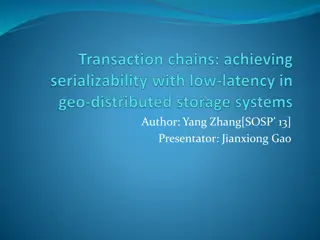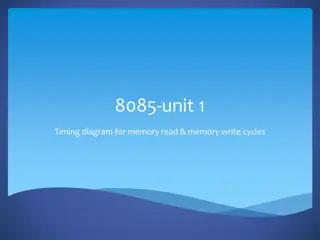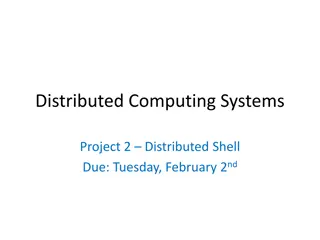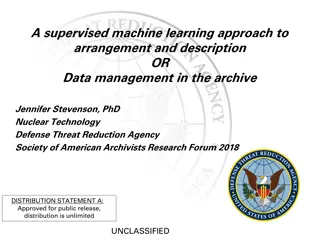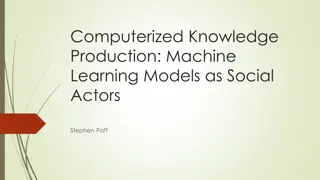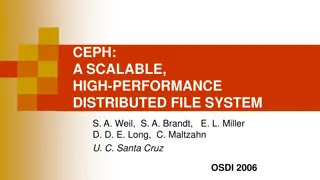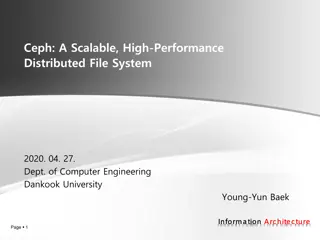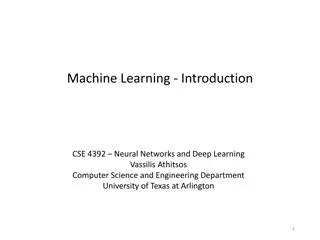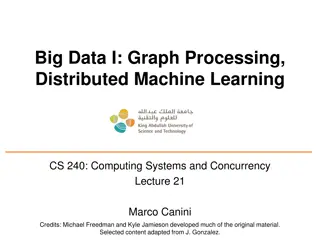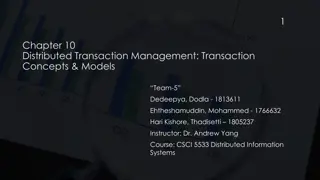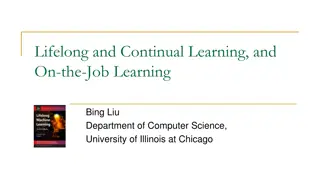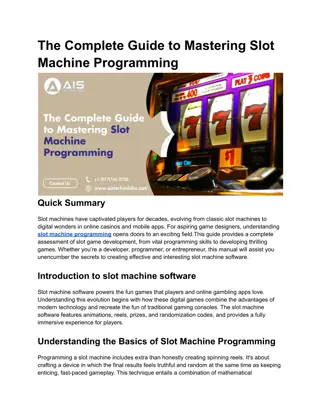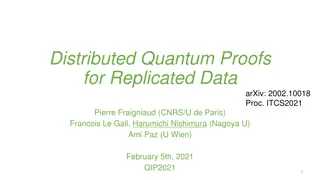Overview of Distributed Systems: Characteristics, Classification, Computation, Communication, and Fault Models
Characterizing Distributed Systems: Multiple autonomous computers with CPUs, memory, storage, and I/O paths, interconnected geographically, shared state, global invariants. Classifying Distributed Systems: Based on synchrony, communication medium, fault models like crash and Byzantine failures. Comp
9 views • 126 slides
Unleash the Power of the DP3150 Facing Lathe from Mudar M Metalworking Machine T
Elevate Your Metalworking Operations with the DP3150 Facing Lathe from Mudar M Metalworking Machine Tools Trading!\nEnhance your used metalworking machine tools capabilities with the DP3150 Facing Lathe available at Mudar M Metalworking Machine Tools Trading!\nExplore our inventory and discover to
1 views • 7 slides
Advanced Machine Learning: Data Preparation and Exploration Part 1
This lecture on advanced machine learning covers topics such as the ML process in detail, data understanding, sources, types, exploration, preparation, scaling, feature selection, data balancing, and more. The ML process involves steps like defining the problem, preparing data, selecting and evaluat
0 views • 80 slides
Understanding CS 394B: Blockchain Systems and Distributed Consensus
This course, led by Assistant Professor Marco Canini, delves into the technical aspects of blockchain technologies, distributed consensus, and secure software engineering. Students will engage in flipped classroom-style classes and paper presentations, critiquing research papers, defending research
0 views • 65 slides
Understanding Parallel and Distributed Computing Systems
In parallel computing, processing elements collaborate to solve problems, while distributed systems appear as a single coherent system to users, made up of independent computers. Contemporary computing systems like mobile devices, IoT devices, and high-end gaming computers incorporate parallel and d
1 views • 11 slides
Understanding Remote Method Invocation (RMI) in Distributed Systems
A distributed system involves software components on different computers communicating through message passing to achieve common goals. Organized with middleware like RMI, it allows for interactions across heterogeneous networks. RMI facilitates building distributed Java systems by enabling method i
1 views • 47 slides
Distributed DBMS Reliability Concepts and Measures
Distributed DBMS reliability is crucial for ensuring continuous user request processing despite system failures. This chapter delves into fundamental definitions, fault classifications, and types of faults like hard and soft failures in distributed systems. Understanding reliability concepts helps i
0 views • 58 slides
CSEP 546 Machine Learning Course Overview
This course, led by Geoff Hulten and TAs Alon Milchgrub and Andrew Wei, delves into important machine learning algorithms and model production techniques. Topics covered include logistic regression, feature engineering, decision trees, intelligent user experiences, computer vision basics, neural net
1 views • 10 slides
Exploration of Learning and Privacy Concepts in Machine Learning
A comprehensive discussion on various topics such as Local Differential Privacy (LDP), Statistical Query Model, PAC learning, Margin Complexity, and Known Results in the context of machine learning. It covers concepts like separation, non-interactive learning, error bounds, and the efficiency of lea
0 views • 14 slides
Seminar on Machine Learning with IoT Explained
Explore the intersection of Machine Learning and Internet of Things (IoT) in this informative seminar. Discover the principles, advantages, and applications of Machine Learning algorithms in the context of IoT technology. Learn about the evolution of Machine Learning, the concept of Internet of Thin
0 views • 21 slides
Classification of Lidar Measurements Using Machine Learning Methods
This study focuses on classifying lidar measurements using supervised and unsupervised machine learning methods. By utilizing machine learning, specifically supervised learning, the researchers trained a prediction function to automatically label unlabeled lidar scans. They conducted steps to implem
0 views • 16 slides
Economic Models of Consensus on Distributed Ledgers in Blockchain Technology
This study delves into Byzantine Fault Tolerance (BFT) protocols in the realm of distributed ledgers, exploring the complexities of achieving consensus in trusted adversarial environments. The research examines the classic problem in computer science where distributed nodes communicate to reach agre
0 views • 34 slides
Distributed Algorithms for Leader Election in Anonymous Systems
Distributed algorithms play a crucial role in leader election within anonymous systems where nodes lack unique identifiers. The content discusses the challenges and impossibility results of deterministic leader election in such systems. It explains synchronous and asynchronous distributed algorithms
2 views • 11 slides
Scientific Machine Learning Benchmarks: Evaluating ML Ecosystems
The Scientific Machine Learning Benchmarks aim to assess machine learning solutions for scientific challenges across various domains like particle physics, material sciences, and life sciences. The process involves comparing products based on large experimental datasets, including baselines and mach
1 views • 35 slides
Mastering Slot Machine Programming_ A Complete Guide
Mastering Slot Machine Programming: A complete guide to developing slot machine games. Learn key concepts, coding techniques, and best practices for creating engaging and successful slot machine games.\n\nSource>>\/\/ \/slot-machine-programming\n
0 views • 5 slides
Overview of Distributed Systems, RAID, Lustre, MogileFS, and HDFS
Distributed systems encompass a range of technologies aimed at improving storage efficiency and reliability. This includes RAID (Redundant Array of Inexpensive Disks) strategies such as RAID levels, Lustre Linux Cluster for high-performance clusters, MogileFS for fast content delivery, and HDFS (Had
0 views • 23 slides
Chi: A Scalable and Programmable Control Plane for Distributed Stream Processing
Distributed stream processing systems are increasingly crucial for various production use cases, such as real-time dashboards, machine learning, and interactive debugging. The challenges of handling large variability in production ingestion workloads and high-degree data skew in queries are addresse
1 views • 20 slides
Understanding Machine Learning: A Comprehensive Overview
Machine learning has evolved significantly over the decades, driven by concepts like Neural Networks, Reinforcement Learning, and Deep Learning. This technology enables machines to learn from past data to make predictions. Activities in machine learning involve data exploration, preparation, model t
0 views • 16 slides
Distributed Software Engineering Overview
Distributed software engineering plays a crucial role in modern enterprise computing systems where large computer-based systems are distributed over multiple computers for improved performance, fault tolerance, and scalability. This involves resource sharing, openness, concurrency, and fault toleran
0 views • 66 slides
Challenges in Detecting and Characterizing Failures in Distributed Web Applications
The final examination presented by Fahad A. Arshad at Purdue University in 2014 delves into the complexities of failure characterization and error detection in distributed web applications. The presentation highlights the reasons behind failures, such as limited testing and high developer turnover r
0 views • 53 slides
Introduction to Machine Learning in BMTRY790 Course
The BMTRY790 course on Machine Learning covers a wide range of topics including supervised, unsupervised, and reinforcement learning. The course includes homework assignments, exams, and a real-world project to apply learned methods in developing prediction models. Machine learning involves making c
0 views • 62 slides
Google Spanner: A Distributed Multiversion Database Overview
Represented at OSDI 2012 by Wilson Hsieh, Google Spanner is a globally distributed database system that offers general-purpose transactions and SQL query support. It features lock-free distributed read transactions, ensuring external consistency of distributed transactions. Spanner enables property
0 views • 27 slides
Understanding the CAP Theorem in Distributed Systems
The CAP Theorem, as discussed by Seth Gilbert and Nancy A. Lynch, highlights the tradeoffs between Consistency, Availability, and Partition Tolerance in distributed systems. It explains how a distributed service cannot provide all three aspects simultaneously, leading to practical compromises and re
0 views • 28 slides
Understanding Distributed Hash Table (DHT) in Distributed Systems
In this lecture, Mohammad Hammoud discusses the concept of Distributed Hash Tables (DHT) in distributed systems, focusing on key aspects such as classes of naming, Chord DHT, node entities, key resolution algorithms, and the key resolution process in Chord. The session covers various components of D
0 views • 35 slides
Distributed Database Management and Transactions Overview
Explore the world of distributed database management and transactions with a focus on topics such as geo-distributed nature, replication, isolation among transactions, transaction recovery, and low-latency maintenance. Understand concepts like serializability, hops, and sequence number vectors in ma
0 views • 17 slides
Understanding Processor Cycles and Machine Cycles in 8085 Microprocessor
Processor cycles in microprocessors like 8085 involve executing instructions through machine cycles that are essential operations performed by the processor. In the 8085 microprocessor, there are seven basic machine cycles, each serving a specific purpose such as fetching opcodes, reading from memor
0 views • 17 slides
Distributed Computing Systems Project: Distributed Shell Implementation
Explore the concept of a Distributed Shell in the realm of distributed computing systems, where commands can be executed on remote machines with results returned to users. The project involves building a client-server setup for a Distributed Shell, incorporating functionalities like authentication,
0 views • 14 slides
Supervised Machine Learning for Data Management in Archives
In this study by Jennifer Stevenson, a supervised machine learning approach is proposed for arrangement and description in archives, specifically focusing on the DTRIAC collection which contains a vast amount of historical documents related to nuclear technology. The aim is to expedite the catalogin
1 views • 15 slides
Social Implications of Machine Learning in Anthropological Research
Exploring the intersection of machine learning and anthropology, this presentation delves into the evolving role of data scientists as modern-day anthropologists studying big data through machine learning. It emphasizes the need for on-the-ground ethnographic analysis to understand the impact of the
0 views • 27 slides
Overview of Ceph Distributed File System
Ceph is a scalable, high-performance distributed file system designed for excellent performance, reliability, and scalability in very large systems. It employs innovative strategies like distributed dynamic metadata management, pseudo-random data distribution, and decoupling data and metadata tasks
0 views • 42 slides
Overview of Ceph: A Scalable Distributed File System
Ceph is a high-performance distributed file system known for its excellent performance, reliability, and scalability. It decouples metadata and data operations, leverages OSD intelligence for complexity distribution, and utilizes adaptive metadata cluster architecture. Ceph ensures the separation of
0 views • 23 slides
Understanding Machine Learning: Types and Examples
Machine learning, as defined by Tom M. Mitchell, involves computers learning and improving from experience with respect to specific tasks and performance measures. There are various types of machine learning, including supervised learning, unsupervised learning, and reinforcement learning. Supervise
0 views • 40 slides
Distributed Machine Learning and Graph Processing Overview
Big Data encompasses vast amounts of data from sources like Flickr, Facebook, and YouTube, requiring efficient processing systems. This lecture explores the shift towards using high-level parallel abstractions, such as MapReduce and Hadoop, to design and implement Big Learning systems. Data-parallel
0 views • 61 slides
Distributed Transaction Management in CSCI 5533 Course
Exploring transaction concepts and models in distributed systems, Team 5 comprising Dedeepya, Dodla, Ehtheshamuddin, and Hari Kishore under the guidance of Dr. Andrew Yang delve into the intricacies of distributed transaction management in CSCI 5533 Distributed Information Systems.
0 views • 56 slides
Lifelong and Continual Learning in Machine Learning
Classic machine learning has limitations such as isolated single-task learning and closed-world assumptions. Lifelong machine learning aims to overcome these limitations by enabling models to continuously learn and adapt to new data. This is crucial for dynamic environments like chatbots and self-dr
0 views • 32 slides
Create Profitable Casino Games with Expert Slot Machine Source Code
Develop successful games with Slot Machine Source Code, php slot machine source code, slot game script, and slot machine script for gaming industries and businesses.\n\nSource>>\/\/ \/slot-machine-source-code\n
0 views • 3 slides
The Complete Guide to Mastering Slot Machine Programming
Learn slot machine programming, slot game development, and casino slot machine software essentials. Explore our complete guide to mastering slot machine software!\n\nSource>>\/\/ \/slot-machine-programming\n
0 views • 4 slides
Concurrency Control and Coordinator Election in Distributed Systems
This content delves into the key concepts of concurrency control and coordinator election in distributed systems. It covers classical concurrency control mechanisms like Semaphores, Mutexes, and Monitors, and explores the challenges and goals of distributed mutual exclusion. Various approaches such
0 views • 48 slides
Quantum Distributed Proofs for Replicated Data
This research explores Quantum Distributed Computing protocols for tasks like leader election, Byzantine agreement, and more. It introduces Quantum dMA protocols for verifying equality of replicated data on a network without shared randomness. The study discusses the need for efficient protocols wit
0 views • 28 slides
Become a Casino Game Developer_ Master JavaScript Slot Machine Code (1)
Learn how to create engaging slot machine games with JavaScript. Master slot machine JavaScript code, slot machine game JavaScript code, and build immersive experiences.\n\nSource>>\/\/ \/javascript-slot-machine-code\n
0 views • 5 slides

